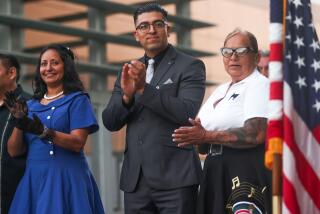Costly Election in Downey Stirs Call for Campaign Spending Cap
- Share via
DOWNEY — Predictions by council members that election spending would hit a record high when then-Mayor Bob Davila hired a professional campaign manager in March turned out to be accurate.
Indeed, the city’s June 3 race between Davila, a retired police officer who spent $16,315, and Roy Paul, who spent $17,916, was the most expensive in Downey history--and that has council members worried about future campaign spending.
At last week’s council meeting, Councilwoman Diane Boggs asked the city staff to research the possibility of putting a cap on campaign spending, reflecting a concern that has been voiced in a number of California cities--including Long Beach and Cerritos--after expensive municipal elections this year.
“I think that Davila really set the tone of the race and maybe of future elections in Downey when he hired a professional,” Boggs said. “I think we’ve reached the point where the average citizen couldn’t run for City Council. Local politics are just that and they should stay that way.”
The only other candidate to spend more than $14,000 in a council race was James Santangelo, who has since become mayor. He spent $15,000 in a citywide election in 1984, according to Robert Shand, city clerk. Santangelo represents District 5.
With 4,266 out of 9,807 registered voters casting ballots in District 2 in June, Davila spent about $9 per ballot in his losing campaign and Paul spent about $8, Shand said.
Need for Consultant Defended
During the election, Davila defended his decision to hire Ralph Pacheco, a Norwalk campaign consultant, by charging that Paul had hired Dale Hardeman, a public relations consultant and former aide to Assemblyman Wayne Grisham (R-Norwalk). Davila said at that time that he “did not stand a chance of winning” unless he hired a professional consultant.
Paul later denied hiring Hardeman, saying he was a longtime friend who volunteered his services.
The number of local politicians hiring professional campaign consultants will continue to increase, according to Bob Stern, founder of the California Commission on Campaign Financing.
“It’s a trickle-down process that began when legislators started using professional campaign managers and local politicians began seeing how effective a campaign manager can be.” said Stern, whose nonpartisan group is currently conducting a study to determine how much was spent on campaign managers in local elections this year.
“I think the arms-race mentality has entered into local politics. Candidates are thinking: ‘I do not dare spend less on my campaign than my opponent’ and his opponent is thinking the same thing.”
Paul said that reasoning prompted him to loan himself $9,000 to stay in the race.
“He (Davila) ran a full-blown media campaign to which I was only able to respond with volunteers and limited funds,” said Paul. “I knew I had to keep up, but I had no idea I would have to reach into my own pocket just to keep in the race.”
Supports Spending Limits
Davila, who loaned $7,986 to his campaign, says he supports putting limits on campaign spending.
“I wish there would be a way to limit campaign spending, because expenses can get out of hand,” Davila said. “Especially when your opponent has influential people behind him and you don’t. That’s what happened to me. I was forced to fight fire with fire.”
Davila’s final campaign disclosure forms show an initial payment of $1,500 to Pacheco, but do not show the $3,500 that Pacheco says he is still owed by Davila.
Davila said last week that he does not owe Pacheco money because he canceled the consultant’s contract in April.
“He really led me on to believe that he could raise the money I owed him. I told him from the beginning that I could not afford his services, but he insisted that the campaign was more important than the money.”
State law requires that candidates account for all expenses incurred in a campaign, but according to Lynn Montgomery, spokeswoman for the state Fair Political Practices Commission, no action can be taken unless a complaint is filed against the candidate. A violation of the reporting law carries a fine of up to $2,000.
Pacheco said he does not plan to file a complaint with the FPPC, but said that he is considering taking Davila to court to settle the dispute.
“My firm and I have discussed the legal remedies, but I am little apprehensive about it,” Pacheco said. “Bob was a good friend as well as a client. . . . I just can’t believe he would do such a thing.”
More to Read
Sign up for Essential California
The most important California stories and recommendations in your inbox every morning.
You may occasionally receive promotional content from the Los Angeles Times.










